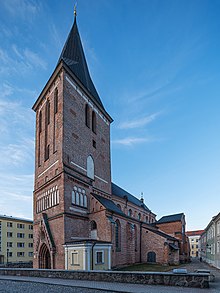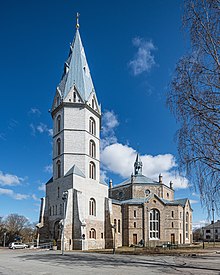Estonian Evangelical Lutheran Church
 From Wikipedia the free encyclopedia
From Wikipedia the free encyclopedia
| Estonian Evangelical Lutheran Church | |
|---|---|
| Eesti Evangeelne Luterlik Kirik | |
 | |
| Classification | Christian |
| Orientation | Protestant |
| Theology | High church Lutheranism |
| Polity | Episcopal-Synodal |
| Primate | Urmas Viilma |
| Associations | Lutheran World Federation, World Council of Churches, Conference of European Churches, Porvoo Communion Community of Protestant Churches in Europe |
| Region | Estonia |
| Origin | 28 April 1949 |
| Congregations | 164 |
| Members | 180,000 (2014)[1] |
| Official website | http://www.eelk.ee/ |
| Part of a series on |
| Lutheranism in the United States |
|---|
 |



The Estonian Evangelical Lutheran Church (EELC; Estonian: Eesti Evangeelne Luterlik Kirik, abbreviated EELK) is a Lutheran church in Estonia. EELC is member of the Lutheran World Federation and belongs to the Community of Protestant Churches in Europe. It is also a member of the Porvoo Communion, putting it in full communion with the Church of England and other Anglican churches in Europe.
History
[edit]The Estonian Evangelical Lutheran Church was constituted in 1949, when the previous church hierarchy, Eesti Evangeeliumi Luteriusu Kirik, which was formed in 1919 and headed by bishop Johan Kõpp, had escaped to Sweden in 1944. When the Soviet Union invaded Estonia in 1940, most Christian organizations were dissolved, church property was confiscated, theologians were exiled to Siberia, and religious education programs were outlawed. World War II later brought devastation to many church buildings. It was not until 1988 that church activities were renewed when a movement for religious tolerance began in the Soviet Union.
Although women had studied theology at Tartu University in the 1920s and some had sought ordination as priests, it was not until 1967 that the first woman, Laine Villenthal, was ordained. In 2014, the church reported that there were 169 men and 43 women serving as ministers.[2]
While the EELC is not an established church, until 2023 it enjoyed a preferential status not extended to other churches in Estonia. In May 2023, Interior Minister Lauri Läänemets said that the state cannot favour one church over others, adding that a committee would be created involving the ecumenical Estonian Council of Churches.[3]
Leadership
[edit]The Church of Estonia is episcopal in polity and is led by five bishops, including the archbishop who serves as the Primate.[4] The archbishop has overall authority, and under his authority there are four jurisdictions, each with its own bishop.
| Diocese | Cathedral | See | Current bishop |
|---|---|---|---|
| Archdiocese of Tallinn | St Mary's Cathedral, Tallinn | Tallinn | Urmas Viilma (Primate of Estonia) |
| Diocese of the Western and Northern Region | St Nicholas Cathedral, Haapsalu | Haapsalu | Tiit Salumäe |
| Diocese of the Southern Region | Tartu | Joel Luhamets | |
| Extra-Estonian Diocese | Canada | Vacant |
Following the retirement of Andres Põder as archbishop, the current archbishop is Urmas Viilma, was consecrated on 2 February 2015.[5]
During the Soviet occupation of Estonia, the Archbishop went into exile, which resulted in the formation of a parallel church, the Estonian Evangelical Lutheran Church Abroad. Until 2010, this body was independent, with its own archbishop based in Canada. In 2010 the two churches reunited, and the former overseas church became a diocese of the Estonian Evangelical Lutheran Church, known as the Extra-Estonian Diocese (Estonian: Välis-Eesti piiskopkond).[6]
Bishops and Archbishops of Tallinn and Primates
[edit]- Jaan Kiivit Sr. (1949–1967) (First Archbishop)
- Alfred Tooming (1967–1977)
- Edgar Hark (1978–1986)
- Kuno Pajula (1987–1994)
- Jaan Kiivit Jr. (1994–2005)
- Andres Põder (2005–2014)
- Urmas Viilma (2015–present)
Membership
[edit]As of February 2009, the EELC reported approximately 160,000 baptized members and the EELC Abroad (based in Canada) reported approximately 8,000 baptized members.[7] A previous figure broke down the EELC Abroad into 3,508 members with 12 clergy in the USA and 5,536 members with 11 clergy in Canada.[8] In 2014, the Lutheran World Federation reported the number of registered members as being 180,000.[1] The church reported that it had served 143,895 communicants.[2]
Social issues
[edit]The church has both theologically conservative and liberal members.[2] The church does ordain women to the priesthood, unlike the more conservative Evangelical Lutheran Church of Latvia and Evangelical Lutheran Church of Lithuania. In an interview, Archbishop Urmas Viilma stated that the church allows women ordination and "will continue to do so". The church disapproves of homosexual unions, believing marriage is the sacred union of a man and a woman. It only allows celibate gay ministers to be ordained. However, Archbishop Viilma did state that if same-sex marriage is legalized in the country, "then the church will clearly need to redefine itself", but he also stated that "we clearly interpret the Bible to say that practicing homosexuality is sin...but we all are equal in God’s eyes and welcome in church."[9] Archbishop Viilma announced his support for civil unions and agreed to be a part of a panel working in 2021 on a proposal to pass a bill to define marriage as heterosexual and to strengthen the civil partnership registration with equal rights for same-sex couples.[10][11] In 2023, in response to the legalization of same-sex marriage in Estonia, the church reaffirmed its position that clergy could only perform or bless heterosexual marriages.[12][13] Archbishop Viilma opposed the legalization of same-sex marriage, arguing that the government could improve the "Cohabitation Act" and that civil unions were sufficient for same-sex couples.[14] The Lutherans leaned toward opposing the death penalty, although they took no official stance, and the church does not have a committee "dealing with social-political questions".[15]
Awards conferred by EELC
[edit]There are three awards conferred by EELC:
- Cross of Merit of EELC (Estonian: EELK teeneterist)
- (Estonian: EELK teeneteristi tunnustusmärk)
- (Estonian: EELK kuldrist).[16]
References
[edit]- ^ a b "Churches in Estonia". lutheranworld.org. Lutheran World Federation. Archived from the original on March 5, 2016. Retrieved February 16, 2016.
- ^ a b c "No obvious option for Lutheran archbishop - Local News - Estonian news in English". Postimees. 24 November 2014. Retrieved 2016-05-25.
- ^ "Estonian government ends long-standing agreement with Lutheran Church". ERR News. Retrieved 27 May 2023.
- ^ Bishops named here (Estonian).
- ^ Consecration date stated here (Estonian).
- ^ Details of reunion at World Council of Churches website.
- ^ LWF Statistics 2009 Archived August 21, 2010, at the Wayback Machine
- ^ A Brief Study of the Lutheran Churches in America Archived 2010-11-21 at the Wayback Machine
- ^ Koch, Tuuli (27 November 2014). "All have sinned". postimees.ee. Postimes. Retrieved April 18, 2016.
- ^ Sooäär, Imre (2021-01-18). "Imre Sooäär: It is time for a social contract on partnership". ERR. Retrieved 2021-06-17.
- ^ "EELK head: Marriage should be defined in Constitution as between man, woman". ERR. 2017-11-30. Retrieved 2021-06-21.
- ^ "Estonia's Lutheran clergy to continue registering only man-woman marriages". ERR. 2023-10-18. Retrieved 2023-12-06.
- ^ Tambur, Silver (2023-10-18). "The Estonian Lutheran Church: The clergy can only officiate a marriage of a man and a woman". Estonian World. Retrieved 2023-12-06.
- ^ Otsmaa, Margitta (2023-04-19). "Archbishop: Coalition acts like a thief pushing through marriage equality". ERR. Retrieved 2023-12-06.
- ^ Bourdeaux, Michael (1995-01-01). The Politics of Religion in Russia and the New States of Eurasia. M.E. Sharpe. ISBN 978-1-56324-356-1.
- ^ "Kirikuseadustik". eelk.ee. Archived from the original on 3 September 2023. Retrieved 18 February 2024.
External links
[edit]- Official website
- The History Files Churches of Estonia
- Map of Church in Tallinn
- Map of Church in Tartu